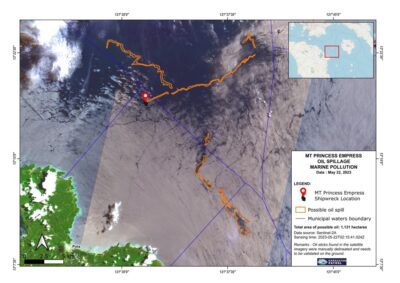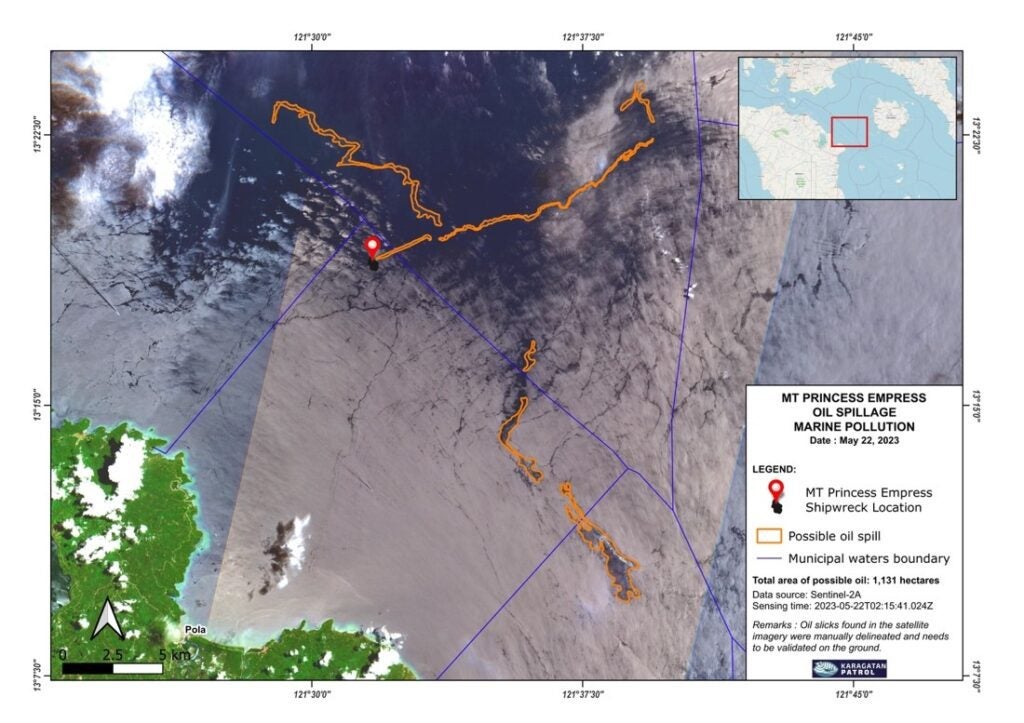Report | May, 2023
Position Paper: Addressing the Oriental Mindoro Oil Spill and Ensuring Accountability for Environmental Damage, & Policy Recommendations
(For the consideration of the House Committee on Ecology and Natural Resources)
The sinking of MT Empress off the waters of Oriental Mindoro three months ago resulted in a catastrophic oil spill that continues to devastate thousands of hectares of corals, seagrass and mangroves1 of several towns in CALABARZON, MIMAROPA and Western Visayas region. The oil spill made and is still making extensive damage in the Verde Island Passage, which is dubbed as the Amazon of the Oceans because it is the most ecologically significant and highly productive ecosystems in the Philippines.
As we witness the intersecting consequences of this incident unfold to the people, the environment, our fisheries and our local economy, this should compel us to reexamine our policies and enforcement so we can improve the country’s oil spill response measures.
Negative impacts are clear.
The ecological disaster in Mindoro has affected 21 marine protected areas (MPAs) and jeopardized the livelihoods and overall economy of the coastal communities.2 According to the National Disaster Reduction and Management Council (NDRRMC), over 193,000 individuals have been affected by this oil spill.3 The damage to the fishery industry and income loss resulting from the massive oil spill in Oriental Mindoro has reached nearly P1 billion, as reported by the Bureau of Fisheries and Aquatic Resources (BFAR).4
Despite the lifting of fishing bans in some areas and several local government units (LGUs) still maintaining restrictions, concerns about the sources and safety of seafood among residents are increasing. This incident has created uncertainty and hardships for business owners most especially the fishermen. The financial strain on fisherfolk, who heavily rely on fishing as their main source of income, is substantial.
Moreover, medical professionals have expressed alarm about the increased risk of cancer development for individuals exposed to the spill, particularly first responders, fisherfolk, and residents in affected communities.5 But beyond the environmental, economic, and health, the mental well-being of those affected has also been deeply impacted. The residents constantly worry about the safety of their catch and the potential health risks associated with consuming contaminated seafood. This is even exacerbated by the lack of access and timely release of important data results of tests being conducted by different concerned agencies.
Assistance sorely needed and immediate action imperative.
A coalition of scientists and environmental groups conducted an independent fact-finding mission to the areas affected by the Oriental Mindoro oil spill. Their findings revealed that assistance provided to affected residents have been insufficient to meet their needs.6 It is distressing to witness the suffering endured by these innocent victims while the shipping company responsible continues its operations, shielded by insurance coverage.
Continuous monitoring of the spread is needed
It has been almost three months, but the oil spill still has not been fully contained. The disaster charter organization that provided maps from satellite imagery of the MT Princess Empress oil spill was already deactivated, with its last feed on April 12, 2023. However, despite this setback, OCEANA’s Karagatan Patrol has taken the initiative to continue monitoring the oil spill using publicly available satellite imagery from the European Space Agency’s Sentinel satellite. This is the latest image captured on the extent of the oil spill:

To ensure accountability for such disasters, a comprehensive and coordinated investigation into this oil spill must be conducted. It is imperative to identify and bring to justice not only the shipping company, but even government agencies also that were negligent in fulfilling their duties, and all parties who contributed to this incident, including charterers and corporations.
Policy Recommendations
There is a need to implement effective and immediate measures to address this ecological nightmare and prevent similar incidents from happening in the future. It is crucial that a thorough investigation must be conducted to answer important questions such as the regularity of surveys and inspections to ensure ships comply with regulations, whether inspections were conducted during construction to ensure adherence to approved plans, drawings, and ship specifications, adequacy of compensation, costs of rehabilitation, to carry the needed legislative reforms. On this last point, we put forward the following policy recommendations for the consideration of the Committee:
- Reexamine Liability: The Oil Pollution Compensation Act of 2007 currently places liability solely on the ship owner, exempting charterers and cargo owners. It is essential to reevaluate this law and consider introducing legislation that holds corporations, charterers, and cargo owners accountable for their involvement in handling hazardous materials.
- Restrict Navigation within Ecologically Sensitive Areas. A legislative measure which will protect ecologically sensitive and biodiverse marine protected areas from the potential impact of oil spills is also needed. This means that to prevent and control oil spills and other marine pollution incidents, it is highly recommended for Congress enact a law restricting access of ships, tankers, and vessels carrying toxic or harmful substances within ecological sensitive areas. This restriction should apply not only to protected seascapes under the Expanded National Integrated Protected Area System but also to ecologically sensitive sea areas and those marine protected areas that are already designated by local government units and other government agencies. The law should establish standards for implementing routing measures that minimize the risks of accidents.
- Institutionalize Oil Spill Response and Contingency Planning. It is crucial to institutionalize oil spill response procedures and develop comprehensive contingency plans. This includes establishing a framework for coordination among relevant agencies, specifying roles and responsibilities, ensuring the availability of adequate response resources, and providing extensive post-assessment measures, including mandatory data sharing. This can be done by incorporating the oil spill response and oil spill contingency plan within the National Disaster Risk Reduction and Management Plan and Framework under the Philippine Disaster Risk Reduction and Management Act of 2010, otherwise known as Republic Act No. 10121. By doing this, we ensure that there are already systems in place in the unlikely event that similar incidents happen. This will streamline the process considering that representatives from the relevant government agencies are already represented in the National Disaster Risk Council.
- Expand Accountability through Criminalization. To emphasize the seriousness of ecological damage and promote environmental justice, acts resulting in Ecocide, defined as “unlawful or wanton acts committed with knowledge that there is a substantial likelihood of severe and either widespread or long-term damage to the environment being caused by those acts.”7 should be criminalized. This includes both intentional and negligent acts contributing to oil spill incidents. Criminalizing such acts sends a strong message of deterrence, accountability, and the need for reparations.
Conclusion
The people of the Philippines have a constitutionally guaranteed right to a clean, healthy, and balanced ecology. Our Constitution explicitly mandates that the State must protect and advance this fundamental right, in accord with the rhythm and harmony of nature. The landmark case of Oposa v. Factoran clarified that the government and all stakeholders have a duty to safeguard and preserve the environment for the benefit of present and future generations.
The ongoing pollution of our waters and destruction of critical marine habitats evince nothing except a clear violation of the people’s constitutional right to a clean, healthy, and balanced ecology. It is imperative to hold those responsible accountable for their actions, omissions, and negligence.
Therefore, we strongly urge the government to take swift and decisive actions to ensure that the right to a clean, healthy, and balanced ecology is upheld and protected for the benefit of present and future generations of Filipinos.
1 https://www.philstar.com/nation/2023/03/30/2255593/oil-spill-5185-hectares-marine-habitat-affected#:~:text=The%20DENR%20said%20the%20waters,affected%20by%20the%20oil%20slick.
2 https://www.philstar.com/headlines/climate-and-environment/2023/03/02/2248742/oriental-mindoro-oil-spill-could-affect-21-marine-protected-areas-denr
3 https://newsinfo.inquirer.net/1761292/group-to-denr-on-oriental-mindoro-oil-spill-make-tanker-owners-pay-up
4 https://www.philstar.com/headlines/2023/04/16/2259170/oil-spill-damage-losses-nearing-p1-billion
5 https://readnow.isentia.com/Temp/173778-936771007/PH0024876701_20240426.pdf
6 https://newsinfo.inquirer.net/1755106/environment-coalition-finds-insufficient-aid-given-to-mindoro-oil-spill-victims
7 Legal definition of ecocide drafted by Independent Expert Panel — Stop Ecocide International, accessed at https://www.stopecocide.earth/legal-definition.
By: Atty. Rose Liza Eisma-Osorio
Acting Vice President and Legal and Policy Director
Oceana

